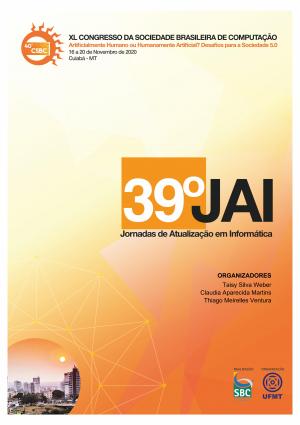Jornada de Atualização em Informática 2020
Palavras-chave:
Modelagem de Processos de Negócio, Infraestrutura da Internet, Dados Geoespaciais, Computação SocialSinopse
O livro da JAI compreende textos didáticos de pesquisadores da comunidade SBC, expoentes em suas áreas de atuação. A JAI oferece uma oportunidade inigualável para estudantes e profissionais de Informática atualizarem-se em temas atuais, conhecendo a visão de pesquisadores experientes. Em 2020, quatro cursos formaram a JAI. Cada um deles corresponde a um capítulo do livro. No primeiro capítulo, “Introdução à Modelagem de Processos de Negócio em BPMN 2.0 e à Automação em BPMS”, os autores, ambos da UFRGS, apresentam conceitos fundamentais de BPM. São descritos os elementos da Notação e Modelo de Processos de Negócio, incluindo qualidade em modelagem de processo. Também é discutida a automação de modelos em Sistemas de Gerenciamento de Processos de Negócio, transformação de modelos e tipos de BPMS existentes. No segundo capítulo, “Como Protocolos Inovadores são Criados e Adotados em Escala Mundial: Uma visão sobre o Internet Engineering Task Force (IETF) e a Infraestrutura da Internet”, os autores, da Mackenzie, UFRGS e Instituto Federal do Sertão Pernambucano, identificam as oportunidades multidisciplinares relacionadas à Internet Engineering Task Force no processo de criação ou melhoria de padrões na Internet. É abordada a organização de grupos de trabalhos e de pesquisa, que conduzem discussões que vão desde o Internet Protocol (IP) até o Things-to-Things (T2TRG) sobre Internet das Coisas (IoT). Já o terceiro capítulo trata de “Dados geoespaciais: Conceitos e técnicas para coleta, armazenamento, tratamento e visualização” cujos autores, da UFMG e UFV, visam alinhar a teoria e a prática, apresentando os principais conceitos e técnicas associadas ao tratamento e manipulação de dados geoespaciais, o que inclui as fases de coleta, armazenamento, tratamento e visualização, com a utilização das principais ferramentas e bibliotecas disponíveis. No último capítulo, “Groupware 4.0: Avanços e Desafios da Computação Social”, as autoras da UNIRIO, UFBA, UFRJ e UFRRJ apresentam conceitos e tecnologias relacionados à Computação Social assim como os avanços e as oportunidades de pesquisa na área. As autoras introduzem também Groupware 4.0 como a evolução das tecnologias de colaboração conectadas às novas demandas de trabalho e aprendizagem em grupo. Os quatro capítulos deste livro apresentam fundamentos e ferramentas para a área de Informática, sendo uma obra especialmente produzida para pessoas que querem iniciar pesquisa ou atividades profissionais nas respectivas áreas abordadas e também para todos os aficionados por tecnologia que se propõem a acompanhar os acelerados avanços da Computação.
Capítulos
-
1. Introdução à Modelagem de Processos de Negócio em BPMN 2.0 e à Automação em BPMS
-
2. Como Protocolos Inovadores são Criados e Adotados em Escala Mundial: Uma visão sobre o Internet Engineering Task Force (IETF) e a Infraestrutura da Internet
-
3. Dados geoespaciais: Conceitos e técnicas para coleta, armazenamento, tratamento e visualização
-
4. Groupware 4.0: Avanços e Desafios da Computação Social
Downloads



